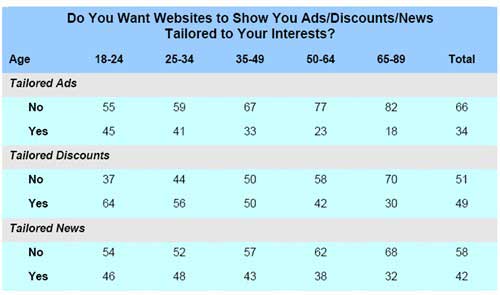Behavioral targeting has become one of the most controversial vehicles for reaching consumers in the digital age. The more consumers know about how they are monitored, the less they like being monitored, according to a study of US opinions about behavioral targeting conducted by professors at the University of Pennsylvania and the University of California, Berkeley.
The study found that most US adults (66%) do not want marketers to tailor advertisements to their interests, and only 47% appreciated getting discounts targeted to their interests:

Knowledge Increases Resistance to Targeting
When respondents were told about three typical ways that information is gathered about consumers in order to tailor ads to their interests, even greater percentages—between 73% and 86%—said they do not want to see such advertising:
![]()
Key findings:
- Even when they are told that the act of following them on websites will take place anonymously, Americans' aversion to it remains: 68% "definitely" would not allow it, and 19% would "probably" not allow it.
- 69% of American adults feel there should be a law that gives people the right to know everything that a website knows about them.
- 92% agree there should be a law that requires "websites and advertising companies to delete all stored information about an individual, if requested to do so."
- 63% believe advertisers should be required by law to immediately delete information about their Internet activity.
The Influence of Age
Although the study found that younger Americans are less resistant to tailored ads than older Americans, more than half (55%) of respondents ages 18 to 24 reported not wanting tailored advertising, and 86% said they don't want tailored advertising if it results from the tracking of their behavior on other websites. Fully 90% of them reject it if it is the result of following what they do offline:

Additional findings:
- Americans mistakenly believe that current government laws restrict companies from selling wide-ranging data about them. When asked true-false questions about companies' rights to share and sell information about their activities online and off, respondents on average answer only 1.5 of 5 online laws and 1.7 of the 4 offline laws correctly because they falsely assume government regulations prohibit the sale of data.
- Signaling frustration over privacy issues, Americans are inclined toward strict punishment of information offenders. 70% suggest that a company should be fined more than the maximum amount suggested ($2,500) "if a company purchases or uses someone's information illegally."
- When asked to choose what, if anything, should be a company's single punishment beyond fines if it "uses a person's information illegally," 38% of Americans answer that the company should "fund efforts to help people protect privacy." But over half of Americans adults are far tougher: 18% choose that the company should "be put out of business" and 35% select that "executives who are responsible should face jail time."
Reasons for Resistance to Targeting
The study authors surmise that resistance to behavioral targeting stems from these reasons:
- "A general antagonism to being followed without knowing exactly how or with what effects."
- A dislike of being labeled and categorized, further exacerbated by the fact that they can't access or alter the labels or categories assigned to them.
- Consumers may worry that information gathered about their leisure time online will result in ads showing up on their computers at work that embarrass them in some way.
- "Fear that selective presentation of advertisements, discount offers, or news will put them at a monetary or social disadvantage: some people might get more useful or interesting tailored content than others depending on the conclusions marketers draw about them."
- A lack of trust that data gathered anonymously about them will remain disconnected from their personally identifiable data.
The study authors conclude their report by saying that "Americans want openness with marketers" and by offering some suggestions as to how marketers can help achieve this.
About the data: The survey was conducted from June 18 to July 2, 2009, by Princeton Survey Research Associates International. PSRA conducted telephone interviews with a nationally representative, English-speaking sample of 1,000 adult Internet users living in the continental United States.



